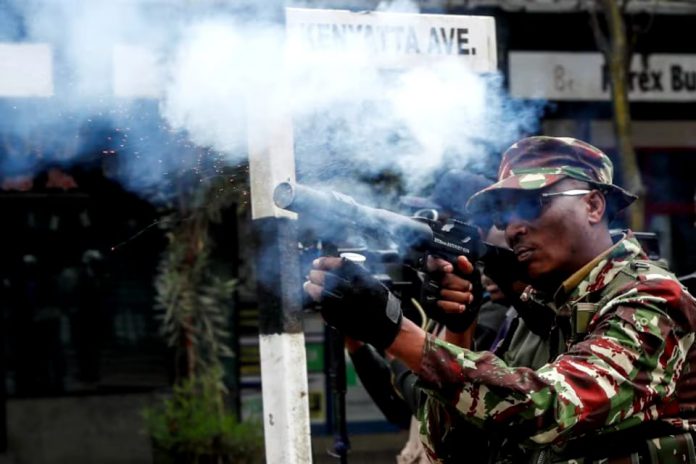Police on Thursday fired tear gas to clear pockets of anti-government demonstrators from Kenya’s capital, Nairobi, as the protest movement sought to capitalise on earlier concessions and to compel President William Ruto to resign.
The “Nane Nane” march, meaning “eight eight” in reference to the date, follows weeks of similar pro-reform protests that saw Ruto scrap planned tax hikes and overhaul his cabinet.
The youth-led nationwide protests began peacefully in June before turning violent, and more than 50 people have been killed.
Shops were shut, and streets were left deserted after riot police set up roadblocks and threw tear gas canisters to disperse handfuls of protesters across Nairobi’s financial district.
Police fired tear gas at one group of a dozen protesters chanting “Ruto must go”, a Reuters journalist reported.
The police arrested 174 people across the country including 126 in Nairobi, acting inspector general Gilbert Masengeli said in a statement.
At least three journalists were wounded when police fired tear gas canisters close to them, the International Press Association of East Africa, which represents hundreds of journalists in the region, said on X.
Police also raided the home of opposition financier and presidential hopeful Jimi Wanjigi, his lawyer Willis Otieno told Reuters in a message.
“He seems to have been placed under house arrest illegally,” Otieno said.
Masengeli said officers had discovered teargas canisters and communications equipment in a car at Wanjigi’s home.
He did not say whether Wanjigi was amongst those arrested, or explain how the raid was linked to the protests.
In what has been the biggest crisis of his two years in office, Ruto bowed to pressure and shelved the new taxes in June after some demonstrators briefly stormed parliament.
Ruto fired his entire cabinet apart from the foreign minister last month, a victory for activists and protesters who had demanded sweeping changes.
Ruto then named opposition members to his cabinet, but activists criticised the move as a corrupt deal and reiterated demands that he resign. They called for far-reaching reforms to tackle corruption and for regional, county, and national governments to improve service delivery.
Ruto has said the new cabinet reflects national unity and will address the demands of the protest movement. He has promised to investigate alleged abuses by the police during demonstrations but has broadly defended their conduct.
Ruto’s reconstituted cabinet was sworn in on Thursday.
“Where Kenya is today, while competition is healthy and good, there is a moment where the interest of a nation is greater than the interest of a political formation,” he said in a speech after the ministers were sworn in.
The protests have no official leaders and have been mostly organised online.
Ruto has stepped up criticism of them after initially praising demonstrators for being peaceful.
“We are a proudly democratic country, based on the firm foundation of the rule of law. There is no room for anarchy, chaos and violence,” Ruto said in Embu County on Wednesday.











